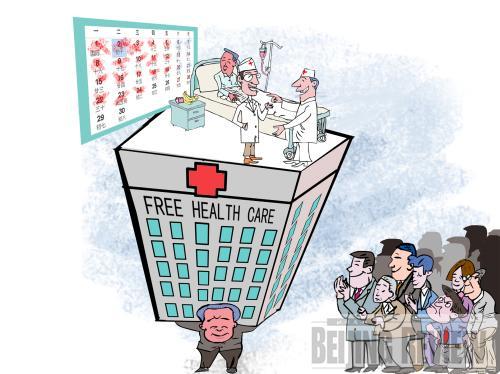|
 |
|
LI SHIGONG |
Local residents in Shenmu County, northwest China's Shaanxi Province, have been enjoying free medical services since March 1. This new scheme came about after the county's strong financial showing due to its massive coal reserves. Shenmu ranked first in Shaanxi in terms of fiscal revenue last year. The free health care program is expected to cost the county at least 150 million yuan ($21.6 million) every year, accounting for about 8.9 percent of Shenmu's annual fiscal revenue. The annual 400 yuan ($57) in per-capita medical subsidy is much higher than the state standard of 120 yuan ($17) by the year 2010.
In the two months after Shenmu offered free medical services, local people were divided over the scheme. First, detractors said, the 150-million-yuan annual expenditure would take a big chunk out of local coffers; second, some people might take advantage of the policy and rush to hospitals for the treatment of even minor ailments or for chronic diseases. They question whether the Chinese people's moral standards are too low at this stage to provide free medical services.
Some people were also suspicious that without an effective supervisory system in place, patients and hospitals might collaborate to deceive the government. Ultimately they believe that once the scourge of corruption has run its course, there will be no money left over for a free medical system.
Could work
Shu Shengxiang (www.xinhuanet.com): In my opinion, only those who hold vested interests will ask whether the government has enough financial input to support a high-level medical insurance system. Shenmu is the top-ranking county in terms of fiscal revenue in Shaanxi Province, with an annual average of 1.67 billion yuan ($240 million). The input into the free health care system is no more than 10 percent of its annual fiscal revenue. Even if Shenmu were not so flush, the free health care service would not be a problem. It is actually a matter of how to better distribute fiscal revenue.
Also, if the public has free health benefits, it means they will have extra money to spend elsewhere, which will boost domestic consumption. This will actually lead to a win-win situation.
Some opponents believe that the majority of Chinese have low moral standards, which is reflected by the fact that many people in Shenmu take advantage of the free health care when in fact they are not ill.
But there are also valid reasons why so many lined up to get free treatment.
To a large extent, the large crowds that gathered at hospitals during the first days of free health care are the result of the current excessively expensive medical costs. For those who could not afford huge medical expenses and those who had to endure pain because they could not pay for treatment, rushing to hospitals is a natural reaction. When free health care gradually becomes the norm, the number of people seeing doctors will drop.
Li Long (Guangzhou Daily): Some Scandinavian countries have offered free medical care and Shenmu is trying to copy this model. While doing so, the county has taken into full consideration actual conditions here in China. This means what Shenmu is providing is just a high-level medical insurance program. Even so, Shenmu is doing much better than the rest of the country in terms of medical reform.
The biggest challenge, as the local government has pointed out, is not money, but the lack of supervision. Free medical services have resulted in crowded hospitals, because the public had endured too much aggravation in the high medical cost days. This reminds us of the notion of "tragedy of the commons" in economics, which describes a dilemma in which multiple individuals acting independently in their own self-interest can ultimately destroy a shared limited resource even when it is clear that it is not in anyone's long-term interest for this to happen. As a result, the public's abuse of limited medical resources may finally ruin this great welfare system. However, this should not be totally blamed on the public. After all, in the current medical environment, no one can refuse the attraction of free health care. But when the public realizes that free medical services have become a regular system, they will behave more rationally.
The problems in the current free health care scheme can be solved through stronger supervision and risk control measures. In no way should we reject the free health care model just because of some problems in the current operation.
Pan Hongqi (Beijing Youth Daily): A free health care system will make hospitals more crowded and beds scarcer. Strictly speaking, this is the price a free health care system has to pay. It will ultimately affect the efficiency of the system itself. Such problems have long existed even in developed countries where free health care systems have been implemented, such as Britain and Canada. Therefore, on one hand, we have to continue to develop free health care, and on the other hand, we should promote the development of private medical institutions. Only when there is adequate medical care can we manage to raise service efficiency as a whole, so as to make up for the inefficient health care operation. It's unfair to say that all the problems are a reflection of low moral standards of the public.
Those who are opposed to Shenmu's practice are worried that the whole country will expect more from the new reform after seeing what Shenmu has done. Actually, the public is not as critical as they seem to be. Nowadays, the public has to pay for all or most of their medical treatment, but the new health care system will be of great financial help with this in future.
| 